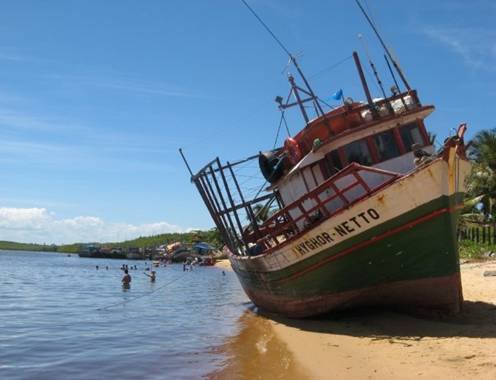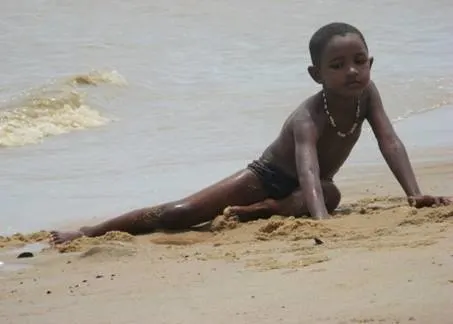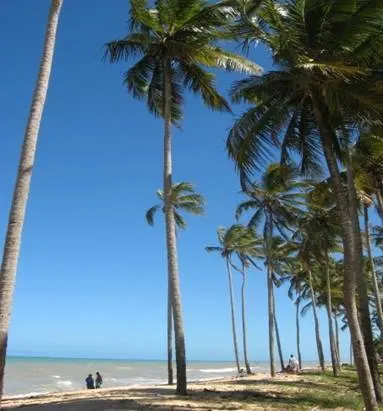The Bahia region of Brazil offers a relaxed way of life, with stunning beaches, wildlife and national parks. It’s one Brazil’s most colourful regions and offers more cultural diversity than many other parts of the country.
Brazil’s is immense in size; a bit smaller than the US and bigger than Europe. So plan your trip carefully and well in advance, unless you have a few years available for your trip!
A short history of Bahia, Brazil
With an area of 564 square kilometres and a population of almost 14m people, Bahia is larger than Spain in size and twice as big as Great Britain. By European standards it feels like visiting another country.
And when it comes to culture, tradition, history and nature Bahia really stands out from the rest of the country. It was there that the Portuguese “discovered” Brazil in 1500 and made it part of the Portuguese empire.
Later, the Dutch took over for a short period of time and it was then that a vast number of enslaved Africans were sold as cheap labour to work in the plantations all around the country. After slavery was abolished it wasn’t profitable anymore for the Portuguese to carry on with the coffee plantations. All those millions of slaves were left to their own destiny.
This is why Bahia is the most colourful part of the country and where people of European descent are a small minority. For the same reasons it is one of Brazil’s poorest parts and unemployment soars, especially in the capital city of Salvador.
Top places to visit in Bahia
Places of interest vary from stunning national parks and scenic valleys, to pristine beaches and a few magnificent islands. The biggest and most well-known national park is that of Chapada Diamantina. This is a plateau of steep cliffs and incredible wildlife which includes snakes, large mammals, birds, and insects.
Another interesting destination is the beautiful beaches around the touristic town of Porto Seguro, such as Trancoso. Caraiva is a remote sea-side village built on the sand where still there’s no electricity other than that produced by petrol generators. Itacare is where the Brazilian surfing championship takes place once a year.
Caravelas, a sleepy village located between a river bank and the sea is another great place to experience proper Bahian life and culture. It doesn’t attract tourists, apart from Brazilians.
From here you can get a boat to Abrolhos National Marine Park, where Charles Darwin made a stop over to do some research in that group of remote islands. Scuba diving and snorkelling is possible in the transparent water full of the most colourful and exotic fish you can imagine.
Bahia’s people
Bahianos (Bahian people) are different to all other Brazilians in a sense that they are very friendly, simple and open. They are what we would call in Europe or the US “cool” people as they don’t seem to know what stress is about.
Bahianos are always up for a laugh, a dance or a chat and they seem to enjoy their time. The main stereotype of any Bahiano is that he’s lazy and never works.
Bahia is also recommended for anyone who wants to learn Portuguese. The people there speak in a quite slowly and in a relaxed manner. They are very patient with “gringos” (foreigners of any occidental country).
African influence on Bahia’s culture
The best part of Bahia though, is daily life which still has a very strong African impact in all aspects. It’s displayed in the food (mainly seafood) and the music (axe, forró).
The culture includes the Yoruba religion – a derived system of Candombe. It also encompasses martial arts in the form of Capoeira. There’s no need to mention a visit to the Salvador, Bahia’s capital, as it is impossible not to pass through it if you’re travelling in Bahia.
Many tourist guides claim that Bahia is a dangerous place and that you should avoid the big cities. However, if you do not carry an expensive digital camera, watch or sunglasses you shouldn’t have any problem.
Showing a bit of respect to all those people who don’t have as much as you do is not such a big deal and it will make your life easier too. In the small places there’s nothing to fear and you will feel that straight away. Common sense is all you need to have and a little bit of insight into people’s problems.
Photo Credits: All photos copyright Modek Sodek
Continue your travels in South America
Warm baths and waterfalls at Baños – in Ecuador
Many thanks* for this guest post to Modi Sodek, who loves travelling and currently works for a company that organises river cruises.
* More info on my policies page
This article is originally published at Heatheronhertravels.com






pickel
Tuesday 7th of June 2011
It’s laborious to seek out knowledgeable folks on this matter, however you sound like you realize what you’re talking about! Thanks
33 More Travel Blogs Looking for Guest Posts | The Working Traveller
Wednesday 22nd of September 2010
[...] Past guest posts: Things to do in Bahia, Brazil [...]
South America Backpacking with Indie Travel Podcast | Heather on her travels
Sunday 25th of July 2010
[...] Relax and enjoy the cool lifestyle of Bahia in Brazil Historic cities, natural beauty and a warm welcome in Colombia 03 Ecuador and the Amazon Rainforest – Podcast Episode 3 [...]
Donna Hull
Thursday 3rd of June 2010
Great guest post, Heather. We often forget how large Brazil is and how many different aspects there are to the country. As long as a visitor uses caution, Bahia sounds like a charming place to visit. .-= Donna Hull´s last blog ..And the Winner of the WikiReader is… =-.
Modi
Sunday 23rd of May 2010
Recife and Olina doesn't belong to Bahia but it's in a nearby district called Pernambuco. I haven't been there but I definitely need to go there too.
About the African heritage in South America I would say that it is very strong in Brazil but almost non existent in other countries, apart from Colombia.